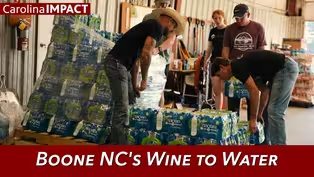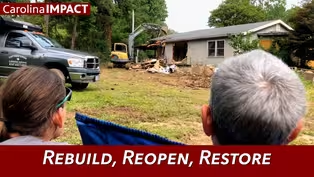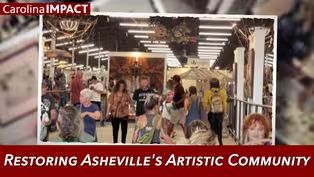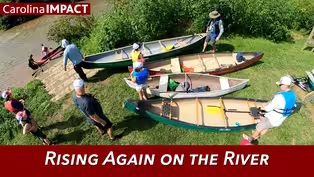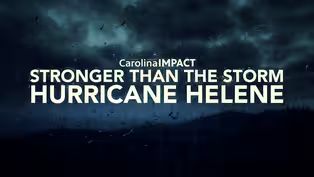
September 16, 2025 | Carolina Impact: Stronger Than The Storm
Season 13 Episode 1302 | 28m 14sVideo has Closed Captions
Rebuild, Reopen, Restore; River Girl Fishing Co.; Wine to Water; & Asheville's Artistic Community.
Neighbors help neighbors in WNC to rebuild homes, reopen businesses, and restore rivers; River Girl Fishing company navigates change, proving resilience flows like the water they love; Boone, North Carolina's Wine To Water works to help those effected by Hurricane Helene with clean drinking water; & Creators in Asheville's River Arts District restore their spaces in the once vibrant area.
Problems playing video? | Closed Captioning Feedback
Problems playing video? | Closed Captioning Feedback
Carolina Impact is a local public television program presented by PBS Charlotte

September 16, 2025 | Carolina Impact: Stronger Than The Storm
Season 13 Episode 1302 | 28m 14sVideo has Closed Captions
Neighbors help neighbors in WNC to rebuild homes, reopen businesses, and restore rivers; River Girl Fishing company navigates change, proving resilience flows like the water they love; Boone, North Carolina's Wine To Water works to help those effected by Hurricane Helene with clean drinking water; & Creators in Asheville's River Arts District restore their spaces in the once vibrant area.
Problems playing video? | Closed Captioning Feedback
How to Watch Carolina Impact
Carolina Impact is available to stream on pbs.org and the free PBS App, available on iPhone, Apple TV, Android TV, Android smartphones, Amazon Fire TV, Amazon Fire Tablet, Roku, Samsung Smart TV, and Vizio.
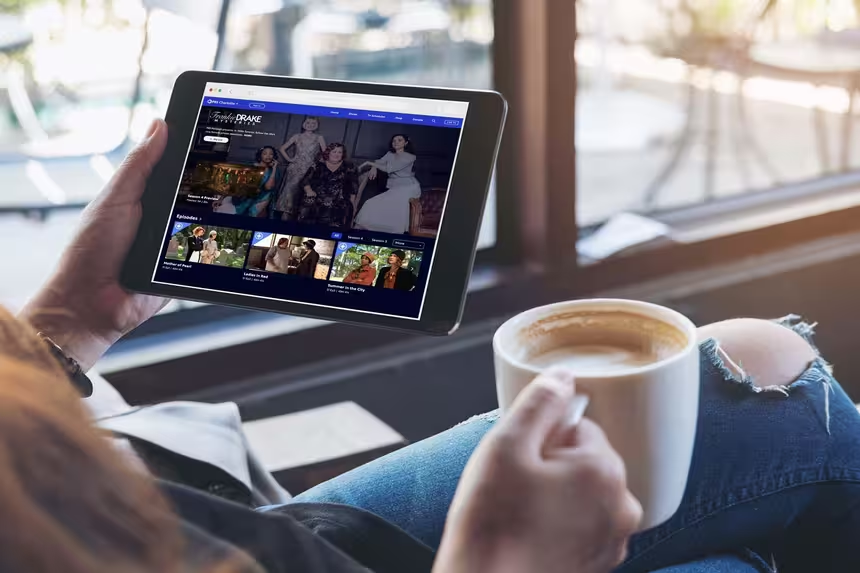
Introducing PBS Charlotte Passport
Now you can stream more of your favorite PBS shows including Masterpiece, NOVA, Nature, Great British Baking Show and many more — online and in the PBS Video app.Providing Support for PBS.org
Learn Moreabout PBS online sponsorship(upbeat music) - [Narrator] This is a production of PBS Charlotte.
Tonight's Carolina Impact Special is supported in part by the Duke Energy Foundation, dedicated to creating vibrant communities across our region and by viewers like you.
Thank you.
(suspenseful music) - [Amy] This week on a special Carolina Impact, stronger than the storm.
A powerful look at how Western Carolina communities came together in the years since Hurricane Helene came to town.
- I think it's very important for people to see that we are recovering.
- [Amy] Meet the mountain neighbors who are helping each other instead of waiting for help from someone else.
- We wouldn't know how many volunteers would show up until 09:30, and we'd have anywhere from 100, or 65, or 20, or two.
- [Amy] Hear their stories.
- I always felt like this place that I called home was immune to disasters.
- [Amy] Share their struggles.
- Great loss.
It was people's heart and soul of things they created and made.
- [Amy] And feel their strength.
- It's my home.
I'm rooted here.
I am part of this little bit of ground.
- [Amy] Helene's damage was like nothing they've ever seen, but tonight, you'll see what happens when neighbors unite to become stronger than the storm on this special Caroline Impact.
Good evening.
Thanks so much for joining us.
I'm Amy Burkett.
When you lose everything to a storm like Hurricane Helene, how do you keep from losing hope?
And where do you find the faith and fortitude to fight back and build back that Helene took away?
Tonight, nearly one year later, PBS Charlotte travels back where the storm was the worst to see how a disaster like Helene also brings out the best in us.
Carolina Impact's Jeff Sonier and videographer Russ Hunsinger are in Burnsville with more on rebuilding, reopening, and restoring after Hurricane Helene.
- Yeah, here in western North Carolina in the mountains, Hurricane Helene, well, it was more than just a storm.
It was a life changer.
12,000 were left homeless after Helene.
Displaced after the storm destroyed their homes and 200,000 more, well, they had their houses damaged by Helene.
But it's not just about the numbers, it's also about the neighbors still struggling after the storm, but also, stronger than the storm.
- Well, there's the top of the line there.
- [Jeff] Sherry Housley reaches above her head to show us where the water rushed in.
That's the watermark there on the wall?
- [Sherry] Yes.
- [Jeff] And where the water rushed out.
- Evidently came from this direction and pushed the sliding glass windows out or sliding glass doors out.
- [Jeff] Good gosh.
- [Sherry] Just shoved it out.
- [Jeff] Like the ebb and flow of an ocean tide, Helene's flood water swirling inside Sherry's old mountain home.
- It was as if a vortex or some kind of washing machine churning, because things got shifted from room to room.
Once I saw it, the first day I saw it, I just sat down and I thought, I can't do this.
- [Jeff] Her family bought this property in 1953.
They paid $10 for two acres between Crabtree Creek and the Cane Branch River.
And for almost a year now, since Hurricane Helene blew through.
- I can work in there and sleep and cook, and you know, in here.
- [Jeff] Sherry's been living in this camper.
With everything from her home she could salvage from the flood and the mud stored in these tents and in this old school bus.
- It's my little crash pad for right now.
- [Jeff] But on this day, Sherry has a tough decision to make.
Maybe the toughest decision she's ever made.
Letting a wrecking crew finish the job that Helene started.
- There are just no words.
- [Jeff] On the house that her parents built.
- This is so surreal.
I mean, I'm just sitting thinking about all the pennies they pinched and they went through so much to build that house, so much, both of them.
- Having a dream come true.
Oh, man.
(metal clanging) - Took my breath away.
Literally, took my breath away.
Felt like a punch to the gut, but I just wanna move forward.
I want to move forward so bad.
- [Jeff] For Sherry, though, moving forward doesn't mean moving off her land.
It means moving in to a new house.
(camera shuttering) Built for her by the construction technology class at Mountain Heritage High School.
Partnering with a Burnsville-based volunteer group known as Rebuilding Hollers, which is helping hundreds of mountain neighbors who need home renovations or home replacements after Helene.
- It's a really big deal.
You know, here people, this is generational land for so many, so I would be the same way.
I wouldn't wanna leave my land.
And so, by giving them a resource to stay on their property until we can get their home build is a big deal.
- I pray for safety.
I pray for Miss Sherry.
This home carries memories.
- [Jeff] And for Sherry Housley, it's a prayer answered.
A chance to make new memories in a new home on the same patch of land that will always be home to her.
- I'm rooted here.
I am part of this little bit of ground.
(somber music) (traffic droning) - [Jeff] 90 minutes south of Burnsville in Chimney Rock Village, half of Bubba O'Leary's General Store is finally reopened for business.
- You're doing a great job.
Thank you.
- [Jeff] Almost a year after Hurricane Helene destroyed the store's other half along with 50 more businesses here on Main Street.
- The devastation, the destruction was just heartbreaking, it was overwhelming.
All the favorites, all the old favorite spots are gone, but everybody that's got a building left, I mean, they're all trying to reopen.
- [Jeff] Store owner, Peter O'Leary is also the mayor of Chimney Rock, but he's not just on the street talking with us.
You'll find him behind the counter too, talking with his customers.
- Thank you.
Appreciate you coming in.
- [Jeff] About what O'Leary calls the new Chimney Rock.
- I think it's very important for people to see that we are recovering.
When we added everything up, we lost 200 jobs.
Basically, the whole employee force of Chimney Rock, the whole workforce was unemployed.
So, it's very important to get those 200 people back to work.
You're not repairing anymore, you're not cleaning anymore, you're actually welcoming customers in.
- [Speaker] Hi, welcome in.
- [Peter] I mean, that's a huge step for all of us.
- [Jeff] The mayor adds, another huge step was the reopening of Chimney Rock State Park, which attracts 400,000 visitors a year, but from the top of Chimney Rock, the view of nearby Lake Lure looks a little different now.
(machinery beeping) Lake Lure sandy beach and Marina now dried up and overgrown.
There's also damage from Helene along western North Carolina's river banks.
But here on this rocky stretch of the Tow River near Mount Mitchell, volunteer groups are raking in new seed, replanting and restoring what Helene washed away.
- Perennial grasses, native shrubs, native flowers, a mix of things that'll take root kind of wherever you put 'em.
They're gonna grow up, spread their seed all down the river from here.
A lot of the banks were totally stripped away.
Some of them we had full forest and now there's nothing, but bedrock or sand.
- We are hoping to that the seeding will help to keep the soil or keep the land.
Well, partly make it look a whole lot better, but it will stabilize.
It needs vegetation to stabilize the earth.
- We've been left with a blank slate in certain areas where we have an opportunity to make it better than it even was before.
- [Jeff] The volunteers are also reseeding native plants on steep mountain mudslides to stop erosion and prevent future flooding, but what if you can't hike there or drive there?
- [Drone] Stand back at a safe distance.
Take off.
- [Jeff] Well, Yancy County is using a drone to replant the riverbanks from a above.
- So over the river, I'd fly it up over the trees about eight or 10 feet over the trees.
The biggest thing it can do is save time.
And I can also access a lot of areas with the drone that we can't access on foot, but you know, we still need those volunteers on the ground.
- The goal is to stabilize the exposed soil around the river so we can keep sedimentation out of the river, because the creatures and animals that live in the river, most of them need this clean water.
- And whether it's restoring rivers, reopening businesses, or rebuilding homes, the reality here in Western North Carolina is that nobody can do everything, but what they're also finding out here is that everybody can do something.
Amy.
- It's extraordinary to see how those neighbors are helping each other.
Thank you so much, Jeff.
To find out more about those neighbor helping neighbor groups working to rebuild, reopen, and restore Western North Carolina, check out our website at pbscharlotte.org.
We've got links to their projects, plus, information on how you can help.
Well, Helene's rage didn't stop there.
It punched the tiny community of Todd too.
With a population of just over 2,000 in a place where the river gives so much, it can also take it all away.
When disaster struck, two women found themselves not just rebuilding a business, but helping an entire community find its footing again.
Carolina Impact's Chris Clark brings us the details.
(screen zooming) (gentle music) - [Chris] Deep in the Blue Ridge Mountains past quiet fields and river bends, you'll find Todd.
Not a person, a mountain town where the water, the woods, and the hills gather like old friends.
It's a place where time slows, the river shows the way, and where River Girl Fishing Company calls home.
- When I was working in Florida, me and the guys would talk about what we would do, if we weren't doing what we were doing.
And I would always say, "Oh, I'd have a fly shop in the mountains and teach people how to fish and go fishing and try to have fun."
- [Chris] Back in 2006, Kelly finally took the leap and turned her dream into a reality.
Starting small with fly fishing at the center.
It wasn't long before visitors began asking for more.
- Folks were coming in asking, "Can we go tubing?"
And I was like, "No, but I'll take you fishing."
"Can we go biking?"
I was like, "No, I'll build a fly rod for you."
So then we started opening up to other things.
- [Chris] What started with a fly rod kept growing, kayaking, then tubing, one idea flowed into the next.
So much so they had to move into a bigger home as quirky and full of personalities as they are.
- Most of the things I have to take down, because it's too gaudy.
So, she only lets me keep one rung of lost souls on the ceiling.
- There used to be 16.
- [Chris] Eventually, adding eco tours, biking, even a little petting zoo.
(pig snorting) - Who would not wanna do this job?
You know, I mean, six months out of the year we're providing a release for people.
- Kelly is so knowledgeable about everything along this river.
So, if you find a plant or a fish, Kelly can tell you exactly what it is.
She can tell you which plants are edible.
- [Chris] They've survived COVID and weathered plenty of storms before, but Helene was different.
- We've had the creek flood before, but this could potentially come into the building.
So, we took all of our equipment, put it into the warehouse in the backyard thinking the warehouse would have it contained.
And we come down here the next afternoon and the warehouse is gone.
- [Chris] Nearly everything they owned, 300 inner tubes, 15 bicycles, numerous kayaks, paddle boats were all trapped in debris or carried away by the river, but the people of Todd came together.
Lending hands and hearts to rescue what they could.
Showing that even in the darkest floods community runs deep.
- All of our friends were down there helping us pull out paddles, pull out tubes, anything that was valuable.
- [Chris] The support didn't end there.
For 19 years, River Girl had run a business, but it was always more than that.
Their customers became family.
And now, that extended family was reaching out to lend a hand.
- With like phone calls, text messages, email messages, Facebook messages, you know, can you check on so and so?
Do you need this or that?
- [Chris] For the next three weeks, they were the command center for relief efforts in the area with volunteers congregating at their place every morning.
- We'd have anywhere from 100, or 65, or 20, or two.
And so, every day that list of needs would change based on how many volunteers we had showing up.
- [Chris] Over the next month from Todd to Creston, Fleetwood to West Jefferson, the group fixed 30 roads or driveways.
They repaired 34 houses and distributed 58 generators.
They gave out over 100 heaters and removed 88,000 pounds of trash from the area.
- And then the magic happened, because we had folks who had purchased boats from us before.
They started donating their own boats and their tubes just to help us get through the coming season.
- [Chris] When the season opened, they hit the ground running, teaching foster kids to fish through the Mayfly Project, running kayaking and tubing trips, even helping raise money for the Todd Hurricane Relief Fund.
And just when it seems they couldn't do anymore, (gentle upbeat music) they found a way to make the river experience unlike anything else.
- They'd be kind, came down to the brunch side.
The tables are set up in the middle of the river.
- We were sitting here a moment ago and we thought to ourselves, is there anywhere else in the world right now that people are eating inside a river, like literally, sitting in the water?
And we figure we're probably the only people in the entire world that are doing this.
- [Chris] Business was holding on, but the crowds just weren't the same.
Then came the lift, not just for River Girl, but the whole community.
North Carolina's first lady Anna Stein paid a visit and her message was clear.
The mountains are still here and they still need us.
- So much of the state and the country came together last fall when Western North Carolina needed us.
And now, they still need us just in a different way.
So, they need us now as much as they ever have.
- [Chris] When people heard that call, it gave businesses a huge lift.
It wasn't just sales, it was a reminder that people still believe in this place.
And looking at what happened, not just as a hardship, but more as a part of the mountain's rhythm, it's carried people forward, helping them endure, adapt, and grow.
- We live inside our houses and we rearrange our furniture inside the house sometimes, 'cause we get bored with it.
And I think Mother Nature just got bored with the furniture outside and she rearranged it a little bit.
- [Chris] In Todd, the river bends, the hills rise, and life carries on.
For River Girl Fishing, the currents haven't pulled them under, it's carried 'em forward and their story keeps on flowing.
For Carolina Impact, I'm Chris Clark.
- What an amazing story of a beautiful river.
Thank you, Chris.
Well, they're not back to last year's numbers just yet, but the trend is headed in the right direction.
And for these two women who've already weathered a storm, the current feels a lot calmer now.
Well, Helene isolated communities and cutoff basic needs like communication, electricity, and clean water.
There were over 1,400 landslides and widespread damage to homes, roads, and bridges.
Carolina Impact's Jason Terzis joins us now with an area nonprofit that helped meet one of the most urgent needs.
- Well, what is it about human nature?
For the most part, we're looking out for ourselves, our families, our careers, and our day-to-day lives, but when disaster strikes true humanity shines through.
People going outta their way to help complete strangers.
For one Boone-based nonprofit, helping strangers in times of need with one of life's most precious commodities serves as its core mission.
(somber music) - [Ricky] Oh my God, it's moved.
It's gone.
It's gone.
- [Jason] On the day after Hurricane Helene, Ricky Ward got his first glimpse of what was left of his home.
- Coming up, I saw the house was turned sideways and I already knew something was very wrong, and I got emotional.
It's gone.
Oh my God, it's gone.
- [Jason] Ricky calling out for his dogs who are still inside, and fortunately, still okay.
- [Ricky] Willie!
Willie!
I see you, Willie.
I see you.
I see you, Embers.
Ah!
- [Jeff] A mudslide had taken out his home.
- The sunroom was way down there in the woods.
Insurance said it was mud, so they're not, they didn't help us.
- [Jeff] Ricky reached out to Boone-based non-profit Wine To Water.
- They were immediate.
It's like the next week they were out here.
- [Jason] He was provided with a tiny home.
Just enough room for himself, his two young kids, and his dogs.
- Big blessing from Wine To Water.
I am, I am, I feel like I'm forever indebted.
- [Jason] Working with area partners to supply nearly 50 tiny homes in Helene's aftermath is just one small part of the Wine To Water story.
- We're an organization that helps get people clean drinking water all over the world.
- [Jason] In 2003, Doc Hendley was finishing up his college degree, working as a bartender to help pay the bills and not quite sure which direction his life was headed.
- I got to a point in my life where I had to choose myself, which wasn't working out so well or love in service of others, which is what my dad tried to teach me as a pastor all growing up.
- [Jason] The biblical term, water to wine, which refers to the first miracle performed by Jesus was stuck in Doc's head.
He then flipped around the words.
- So, I just went and wrote in something like in Google, like water issues or water problems, and what filled that computer screen up that night is what changed the whole course of my life.
- [Jason] What Doc saw were people around the world without clean drinking water.
- I had no idea that there was a global water crisis.
I had no idea that over a billion people with a beat lack access to safe drinking water in the world.
- Everybody deserves to have clean water.
That shouldn't be a problem.
- It's like, what do you mean you can't turn the tap on and get clean drinking water?
- And I remember being like, you know, I've gotta do something about this.
Six months later, August of 2004, I quit my bar job and moved to Sudan.
- [Jason] Doc began installing water systems.
Leading efforts to dig, repair, and sanitize drinking wells in the world's most underserved areas.
- We often are working in the most remote locations around the world - [Jason] Today, Wine To Water employs 120 people worldwide, but never did they think the need for their services would come right in their own backyard.
- [Speaker] Oh my God.
- The initial thought I had was just kind of, wow, what just happened?
- I always felt like this place that I called home was immune to disasters.
- [Jason] With no cell service and roads everywhere blocked, Wine To Water employees and over 1,000 volunteers distributed 1.2 million pounds of emergency supplies and over 400,000 gallons of clean water.
- We went through like hundreds of thousands, millions of bottles of water in the first few days just to get people water.
- Just the response, just seeing it gave hope.
- As soon as we're able to, we'll switch to a longer solution to where they can go right to the creek and get water, if they can.
So, we have a filter, we make this filter right here.
I wouldn't drink this, nobody would drink this.
I wouldn't give this to my kids, but I'll drink that, and I'd give it to my kids.
I trust it.
I drink it all over the world so.
- [Speaker] Salud.
- This is based off of the same technology as kidney dialysis.
So, the same type of membrane that we use when we clean people's blood.
It gets rid of all your bacteria, your proteases, anything that's gonna make you or your children sick, this is going to take care of it.
- Right now, what we're doing is offering water quality testing to any of the counties that have been impacted by the storm.
- We collect that sample and then we take it to a lab and within five to 10 days we'll have results for that homeowner and we will work with people to help solve any issues that emerge.
- [Jason] From supplying bottled water, generators and filters to water quality testing and solutions, and working with partners on things like debris removal, well repair, and tiny homes, for Wine To Water, it's always been about serving those in need.
- Mother Nature has done a good job of covering up the scars.
Man, mountain people are really resilient.
(gentle music) (Courtney sighing) It makes me emotional to think about this.
- As terrible and awful as it was, it also was a beautiful thing, not just for me, but our own community to see people rallying together and it was a beautiful thing to watch happen afterwards, after the disaster.
- That's some pretty amazing technology.
- Yeah.
- Jason, what else can you tell us about Ricky and how he's doing?
- Well, first of all, he's got a great attitude about all this, which I think really goes a long way.
But that tiny home he's sharing with his kids, it's a short-term solution.
People are chipping in to help him get a full-size home back on that lot, which should be happening soon.
And because so many people have helped him, Ricky is paying it forward.
He has his commercial driver's license and went out to California as a volunteer with Wine To Water to help distribute water after the LA wildfires earlier this year.
So, he's like, so many people have been helpful to him.
He wants to help others now, and it's just so nice to see that humanity and people trying to help others.
- In horrible situations, the best of us comes out.
- Absolutely.
- Thank you, Jason.
Asheville's River Arts District has always been a place where creativity flows as strong as the French Broad River.
When Hurricane Helene tore through, it damaged nearly 80%.
Carolina Impact's Dara Khaalid and videographer Russ Hunsinger explore how the marketplace and makers work together to rebuild.
(somber music) - [Dara] It's nearly dark inside as construction workers smooth out the drywall under the beams of their portable lights.
- Today, the electrician is finishing up a lot of the last minute detail, because there was a lot of detail for him to work on.
And the drywallers are finishing inside there, prepping for paint.
- [Dara] Moving swiftly about a dozen workers are restoring Marquee Asheville, the once bustling marketplace housed inside this 50,000 square foot warehouse where people could find unique antiques, local handcrafted jewelry, and art that exuded the colorful spirit of the city.
- The Marquee was basically birthed as a place of creative community, having a marketplace of variety, things that are just kind of like over the top, things that you wouldn't see in very many places.
- [Dara] Before these stalls stood silent, divided by bare walls, and waiting for fresh paint they pulsed with life, more than 300 artists, antique dealers, makers, and small business owners filled the space drawing customers from every corner of the country.
It was the realization of a dream Robert Nicholas had been building since opening the doors in 2021.
A dream that turned an old warehouse into a vibrant community.
- We looked forward to see who was coming in that door.
If it was a familiar face or a new face that would later become a familiar face.
And you know, our artists had come walking up the ramp and you'd start smiling all the way at the bottom to the top and giving hugs.
(somber music) (tree rustling) - [Dara] But in September, 2024, Hurricane Helene's raft came rushing in, washing all of that away.
- We had about 15 feet of water, which is up on the ceiling, about three feet above the windows that you see here.
So, it was substantial.
And this wall broke out, a lot of things went out this way and was never seen again.
- [Dara] Robert says they had 120,000 items worth almost $9 million in inventory.
This was a devastating hit financially, but also, emotionally.
- It's like somebody stole it, you know?
And you're looking for parts and pieces of the memories, you know, and so, it was a great loss.
It was people's heart and soul of things they created and made.
(upbeat music) - [Dara] And one of those people is Mark Schieferstein.
Owner of Scrap Monkey, who made nearly a third of his income selling his handmade jewelry created from salvage materials at the Marquee.
- It was kind of disbelief.
It was definitely emotional.
It is pretty devastating.
- [Dara] Mark didn't salvage a single item from the building after Helene.
Thousands of dollars in merchandise gone in an instant, and the storm's toll didn't stop there.
Just a few miles away his metal shop was swallowed completely.
Yet, even in the face of such loss, Mark is determined to rebuild.
Proving that while the waters rose, his resolve runs deeper.
- You're wearing, you know, a suit and rubber gloves and a respirator trying to get your stuff out of a space that's just black mold.
- [Dara] After losing both the Marquee space and his metal shop, he refused to let Helene wash away his craft.
On his land in the quiet hills of Marshall, just steps away from his front door, Mark transformed a humble shed into a new workshop.
(gentle upbeat music) Here, surrounded by the resilience of the mountains, he's hammering out a fresh start, creating bold, geometric jewelry from materials most people throw away.
And it's not just survival, it's artistry reborn.
- We're always gonna find a way to make stuff and get stuff out to the public and keep doing what drives us every day.
- [Dara] Back at the Marquee, Mark gets a chance to return the favor of supporting another creative by choosing to be a loyal vendor.
Persevering with Robert through the reconstruction and keeping his business at the soon to open marketplace.
- For them to rebuild that is amazing.
To give like hundreds of artists an outlet to keep what they love to do going, it's a pretty monumental task.
- [Dara] Monumental, but worth it, because for Robert and many in Asheville, rising again isn't just a personal journey.
It's about joining hands with others, standing shoulder to shoulder, and living out the true spirit of resilience.
A spirit that echoes across the entire region.
For Carolina Impact, I'm Dara Khaalid.
- Thank you, Dara.
Robert says, the structure and rebuild cost around a million dollars.
The grand reopening for Marquee Asheville is set for September 25th.
Hurricane Helene changed the landscape, but it couldn't change the heart of these mountains or the people who called them home.
We're honored to share their stories that show those impacted are truly stronger than the storm.
Thanks so much for joining us for this Carolina Impact Special.
Goodnight, my friends.
(upbeat music) - [Narrator] Tonight's Carolina Impact Special is supported in part by the Duke Energy Foundation.
Dedicated to creating vibrant communities across our region and by viewers like you.
Thank you.
- [Narrator] A production of PBS Charlotte.
Boone NC's Wine to Water | Carolina impact
Video has Closed Captions
Clip: S13 Ep1302 | 6m 30s | Wine To Water works to help those effected by Hurricane Helene with clean drinking water. (6m 30s)
Rebuild, Reopen, Restore | Carolina Impact
Video has Closed Captions
Clip: S13 Ep1302 | 7m 51s | Neighbors help neighbors in WNC to rebuild homes, reopen businesses, and restore rivers. (7m 51s)
Restoring Asheville's Artistic Community | Carolina Impact
Video has Closed Captions
Clip: S13 Ep1302 | 5m 16s | Creators in Asheville's River Arts District restore their spaces in the once vibrant area. (5m 16s)
Rising Again on the River | Carolina Impact
Video has Closed Captions
Clip: S13 Ep1302 | 6m 2s | Fishing company navigates change, proving resilience flows like the water they love. (6m 2s)
September 16, 2025 Preview| Carolina Impact: Stronger Than The Storm
Preview: S13 Ep1302 | 30s | Rebuild, Reopen, Restore; River Girl Fishing Co.; Wine to Water; & Asheville's Artistic Community. (30s)
Providing Support for PBS.org
Learn Moreabout PBS online sponsorship
- News and Public Affairs

Top journalists deliver compelling original analysis of the hour's headlines.

- News and Public Affairs

FRONTLINE is investigative journalism that questions, explains and changes our world.












Support for PBS provided by:
Carolina Impact is a local public television program presented by PBS Charlotte
